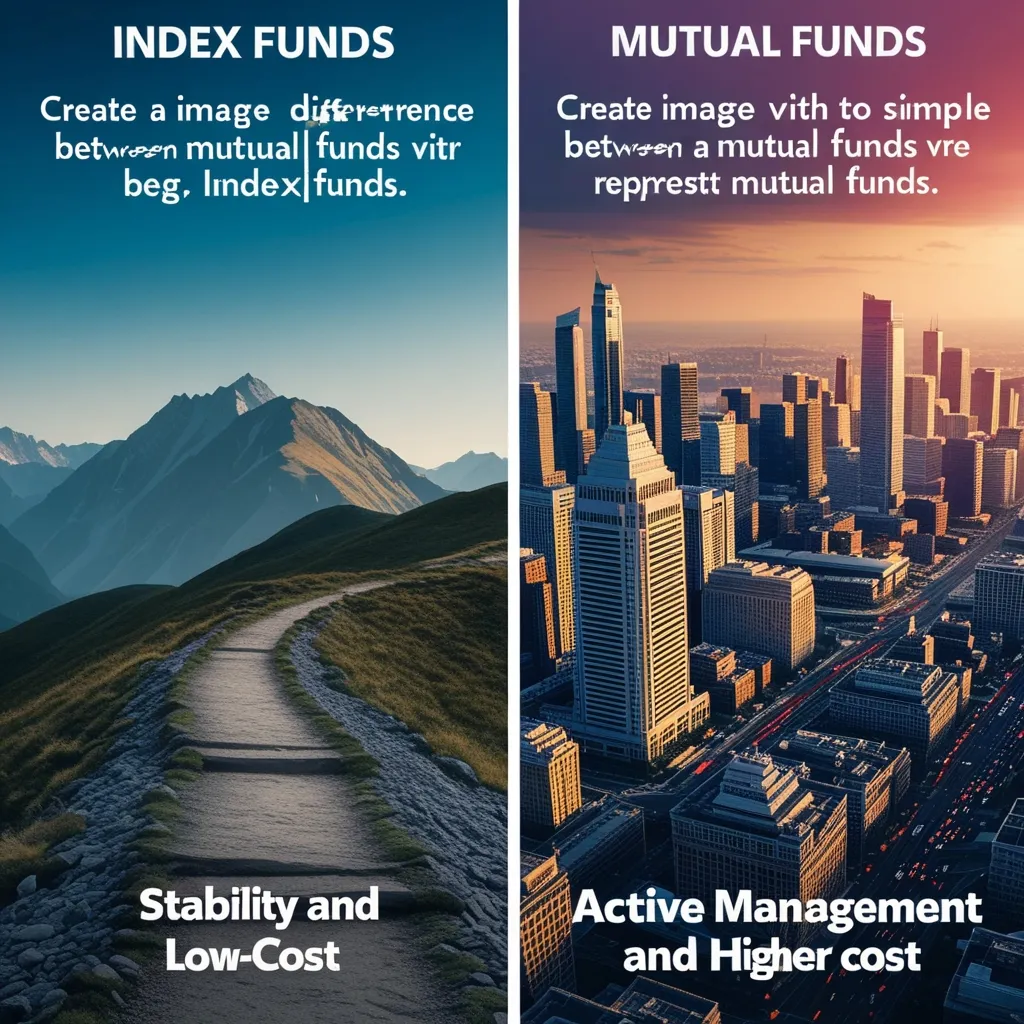Investing can sometimes feel like navigating a maze with your eyes closed, especially when you’re trying to figure out the maze of different funds available. Among all the options out there, index funds and mutual funds are like the North Star – guiding many investors to their goals. While they’re often talked about interchangeably, they really shouldn’t be because they differ quite a bit.
Index Funds in a Nutshell
Let’s kick things off with index funds. If you imagine the stock market as a massive playlist, index funds are like a curated list of the biggest hits. They aim to mirror the performance of a specific market index, like the S&P 500 or the Dow Jones. Your investment in an index fund essentially means you’re putting a small amount of money into all the companies that make up that index. Think of it like getting a sampler platter at a restaurant – you get a taste of everything.
What’s appealing about index funds is their straightforwardness. They’re passively managed, meaning there’s no financial wizard behind the curtain trying to beat the market by picking and choosing stocks. The fund just follows the index it’s tied to. This simplicity not only reduces costs but also often leads to more stable returns. Over the long haul, indexes like the S&P 500 have historically given solid returns, like around 10% annually, though they can swing up and down in the short term.
Mutual Funds Decoded
Now, let’s jump into the world of mutual funds. If index funds are the sampler platter, then mutual funds are the chef’s special – crafted by expert hands aiming to give you the best dining experience. Managed by professional fund managers, mutual funds are all about trying to outperform the market. The managers analyze the market, decide which securities to buy or sell, and continuously tweak the portfolio to achieve better returns than the benchmarks.
These funds can be invested in a broad spectrum of assets – stocks, bonds, commodities, real estate – you name it. This active management does come with its own set of higher costs, as it covers manager salaries, research expenses, and other operational fees. Because of this active approach, mutual funds tend to fluctuate more and can be a bit riskier compared to the stable nature of index funds.
Differentiating Factors
Management Style
The primary distinction lies in their management. Index funds adopt a passive management style – they follow a set index without any active decision-making. On the flip side, mutual funds are actively managed, with managers making moves based on market analysis to try and beat the market.
Investment Goals
When it comes to investment goals, index funds aim to match their respective market indexes, which means stable and consistent returns in the long run. Mutual funds, however, aim to outperform the market, leading to the possibility of higher returns but also inviting higher risks.
Cost Considerations
Cost is another striking difference. Index funds generally have lower expense ratios because they’re not actively managed. We’re talking about something in the range of 0.05% to 0.10% annually. Mutual funds have steeper expenses – usually around 0.50% to 1.50% or even more, due to the active management involved.
To put this in perspective, if you invested $10,000 in an index fund with a 0.05% expense ratio, you’d be paying just $5 per year in fees. But if you placed the same amount in a mutual fund with a 1% expense ratio, you’d be shelling out $100 annually. Over time, these costs can add up and significantly affect your returns.
Performance
Historically, index funds often outperform actively managed mutual funds in the long term. Studies show that fund managers struggle to consistently beat the market. For instance, in 2021, about 79% of fund managers didn’t manage to outperform the S&P 500. It’s not easy to outshine an index that’s composed of the market’s heavyweights.
Suitability for Your Portfolio
Choosing between index funds and mutual funds boils down to your personal investment goals, risk appetite, and how long you plan to stay invested.
Newbies and Long-Term Investors
For those just dipping their toes into investing, or for long-term investors, index funds are typically the way to go. They provide instant diversification, stable returns, and come with lower costs. Investing in an index fund is like getting a slice of the whole market with a single move, mitigating the risk compared to picking individual stocks or active funds.
Adventurous Investors
For those with a higher risk tolerance looking for potentially higher returns, mutual funds might be more attractive. But it’s essential to do your homework – assess the fund’s historical performance, check the credibility of the management team, and pay attention to the fee structure before diving in.
Cost-Conscious Investors
If minimizing costs is a priority, index funds are the clear winners. The low expense ratios can save you a ton of money over the years, which otherwise would have eaten into your returns.
Practical Considerations
When weighing the decision between index funds and mutual funds, a handful of practical factors come into play.
Trading Costs
Investing in an ETF version of an index fund might mean paying a brokerage commission unless your broker offers commission-free trading. Mutual funds, meanwhile, can come with sales loads or commissions that might set you back right from the get-go.
Brokerage Availability
Not every brokerage offers the same array of mutual funds, so it’s worthwhile to check whether your broker lists the particular fund you’re interested in. However, ETFs are generally available through any brokerage platform.
Convenience
Mutual funds might score higher on convenience, especially if your broker provides them directly on their platform. This can spare you the hassle of opening a new account. But ETFs also bring their own convenience, as they offer the flexibility to trade throughout the day.
Wrapping It Up
To sum things up, both index funds and mutual funds have carved out their niches, serving different investor needs. Index funds offer a low-cost, diversified, and stable route to investing in the market, making them great for beginners and those in it for the long haul. Mutual funds, with their active management, could appeal to those willing to take on more risk for the chance of higher returns but come with higher costs and volatility.
Ultimately, the decision between the two should align with your financial goals, risk tolerance, and investment timeline. Having a solid grasp of the differences can empower you to build a portfolio that best suits your unique needs.
Investing doesn’t have to be a daunting puzzle. Once you understand these options better, you’ll feel more equipped to make decisions that can potentially set you up for financial success. Whether you choose the steady path of index funds or the more dynamic route of mutual funds, staying informed is your best strategy.






